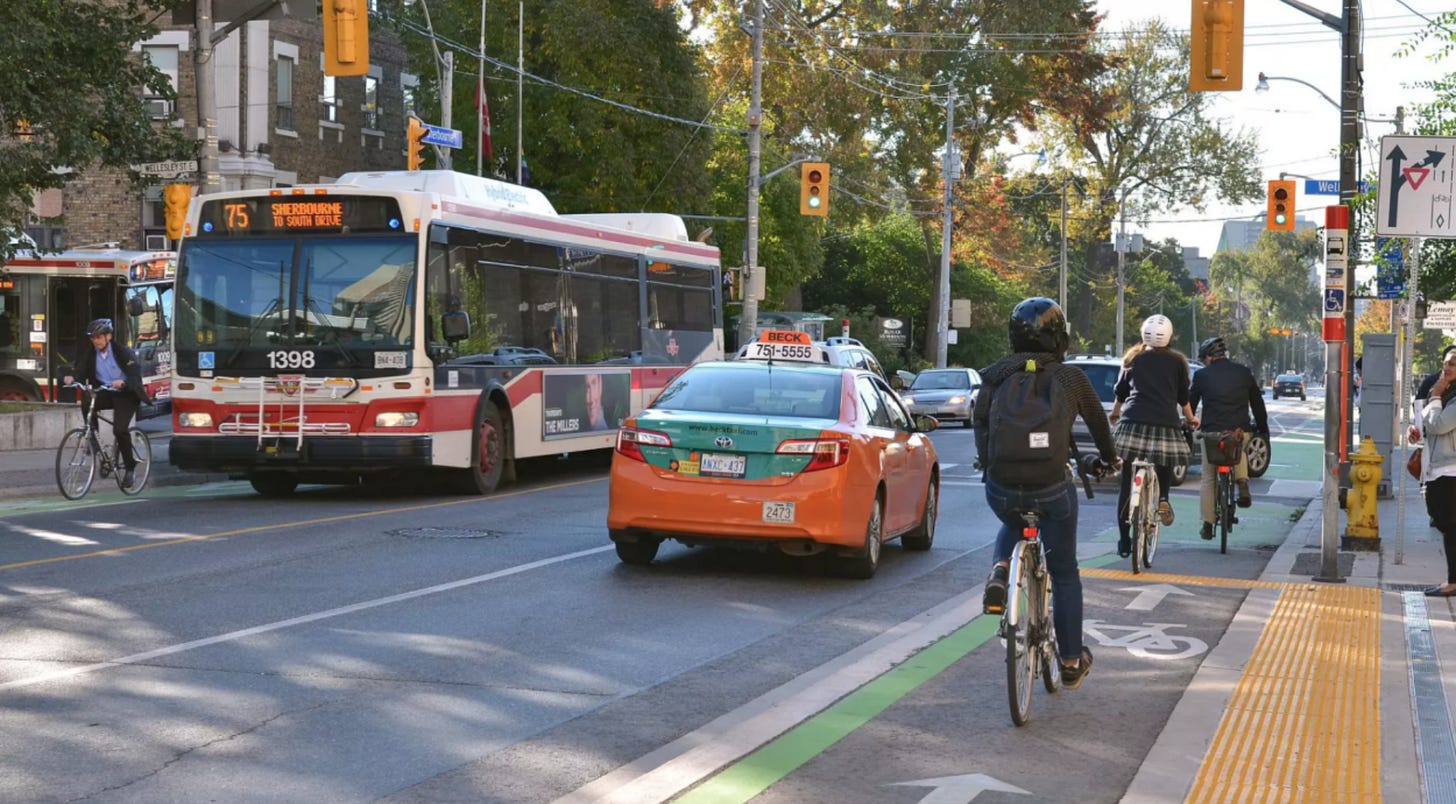ADAMS: A Long Wait for a Chicken Strip Basket—And a Sobering Reminder of Ontario’s Car Culture Crisis
I Just Wanted Chicken Strips—Instead I Got a Front-Row Seat to Ford’s Assault on Local Democracy
Busy urban street with cyclists in a bike lane, cars and buses on the road, and pedestrians on the sidewalk. Image credit: Unknown
Yesterday afternoon, with the semester over and a bit more time on my hands, I decided to do something simple: head out for a chicken strip basket and a chocolate milkshake at Dairy Queen. Rather than order in, I thought I’d take the bus—an easy enough idea on paper, and a welcome excuse to get out of the house and see a bit of the community again while I write.
As a writer, I like to bring readers along for the journey. And while the service was fine—no complaints about that—what stood out most wasn’t the meal or the destination. It was everything I saw (and heard) on the way there.
The ride to Courtice took far longer than it should have. I left my house ten minutes before the scheduled arrival, only to end up waiting 40 minutes in total. That kind of delay isn’t just an inconvenience—it’s a barrier to accessibility, especially for those who rely on public transit every day.
When I finally got off the bus, I made my way across the street—waited for the light to change, followed all the rules, did everything right. But none of that mattered to the driver of a comically oversized truck who decided his impatience took precedence over my safety. He honked, he shouted profanities, and he kept trying to push forward despite the fact that I was still in the middle of the crosswalk.
It was a near miss. A close call. And sadly, it wasn’t the first time.
In 2024, a similar incident unfolded—another aggressive driver in a truck, plastered with profane anti-government decals, ignored a red light and nearly hit me while I was crossing. He honked. He sped up. And I had to leap back to avoid being struck.
It’s hard not to think about the bigger picture when something as simple as walking across the street has become a dangerous act. The truth is, these aren’t isolated incidents. They’re the natural consequence of a province led by a Premier who sees city planning and public safety not as essential responsibilities, but as personal inconveniences.
Just look at what’s happening in Toronto.
Mayor Olivia Chow is trying to do what any competent, forward-thinking leader should do: give people real choices. Safer streets. Expanded transit. Bike lanes that actually connect communities instead of ending abruptly at the edge of a political talking point.
But Doug Ford doesn’t like bike lanes. Not because they don’t work—studies such as this one from 2016 by PeopleForBikes show they do. Not because the people of Toronto don’t want them—they clearly do. But because he, personally, finds them inconvenient. He wants them ripped up so his ten minute commute to Queen’s Park is a little easier.
When Ford didn’t get his way, he crashed out—not just at Chow, but at the courts. After a judge ruled against his efforts, he publicly mused about how we supposedly have too many “bleeding-heart judges” and how we need “more conservative-minded judges,” a chilling sentiment in any democracy. But it didn’t stop there.
Ford is now attempting to revive a shelved Ontario Liberal bill—Bill 241—the “Municipality Accountability Act.” This bill would give the Premier unprecedented power to declare the offices of municipal councillors or even mayors vacant, at will. In other words: if a local government doesn't roll over, Ford wants the power to simply erase it. U.S style authoritarianism is creeping into this province through the side door, but that “Canada is Not For Sale” hat made for a great photo-op.
Compare this to Kathleen Wynne’s handling of her predecessor's brother. Rob Ford’s tenure as Mayor of Toronto was chaotic, even embarrassing at times. But Wynne had the wisdom to recognize that Toronto’s problems should be solved by Torontonians. She didn’t call for sweeping power grabs. She respected the autonomy of municipalities—even when it was politically inconvenient.
Doug Ford has chosen the opposite path. He governs with a vendetta. And while he’s preparing to spend billions of dollars digging a vanity tunnel under a tolled highway, basic services like the TTC are left struggling. Buses are late. Drivers are underpaid. Riders, like me, are left wondering if they’ll even make it home in one piece.
Instead of investing in transit or road safety education, he’s handing out driver’s licenses like they’re candy—then feigning surprise when yet another reckless truck driver nearly mows someone down in a crosswalk.
I should be able to take the bus to get a chicken strip basket and write without fearing for my life. But right now, in Doug Ford’s Ontario, that’s apparently too much to ask.





